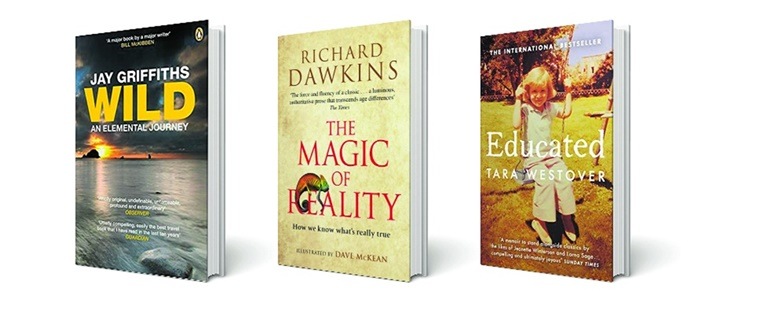 If you want to clear your mind begin with Richard Dawkins.
If you want to clear your mind begin with Richard Dawkins.
Now that Mother Nature has the whole world by the throat, it’s time we took another good hard look at our relationship with her – and how we’ve reacted to this monumental crisis. Judging by some of the WhatsApp forwards doing the rounds in India, it seems the magnitude of the crisis has been completely overshadowed by the magnitude of the ignorance of our “educated” class. While the poor Italians and Spaniards went out into their balconies to cheer and sing for their beleaguered medical workers, we, in India, did so to “spiritually cleanse” the country of the virus!
Apparently, the chanted prayers (and clattering pots and pans) of 1.3 billion Indians, “matched the resonant frequency of the diurnal multipath propagation over the Indian subcontinent.” Further, “scientists,” say that it would definitely have created a ducting effect in the lower troposphere, which would either trap the virus in a “continental duct” or would have columned the virus towards the stratosphere”. And hey presto, in a week, all the viruses would be ducted away!
To counter this astonishing “scientific” balderdash, here’s a brief list of books I would strongly recommend. First, a good mind-clearing dose of Richard Dawkins. You could start off with his book, The Magic of Reality (2011). It’s been written for young readers but that makes it even easier to understand. Dawkins takes various questions — who was the first person? Why are there so many different kinds of animals? What are things made of? — and answers them in two ways: first, he mentions some of the traditional explanations that have been given by people all over the world and counterpoints this with the scientific explanation of the phenomenon. Since we’re dealing with nature in this column, read the chapter on evolution to start with — it has been wonderfully explained and Dawkins’s diamond-hard logic is impeccable. You may be loath to believe that our ancestors were fish, or centipedes or even chimpanzees — but Dawkins has a clear and simple way of showing us that this is, indeed, the case. Hopefully, the book should go some way in “ducting” the wooliness in our heads into the stratosphere!
The second book I’d recommend is Jay Griffiths’ Wild (2006). Griffiths is a British journalist who spent years among tribal and native people around the world. She drank psychotropic potions with the shamans of the South American rainforests, interacted with cannibals in New Guinea (amongst the kindest people she encountered) and the Inuit of the icy polar regions, amongst others. Now, I do have reservations about the practices of “medicine men” and “witch doctors”, but the overarching theme of this book is that all of these tribes lived as a part of and in tune with nature — and did not treat her as their main adversary, to be trampled upon, cut down, drowned, conquered, and exploited. And that, no matter how “civilized” we pretend we are, deep down, the wild spirit remains.
Another major takeaway from this book is the fact that what the bat or pangolin has done to us is exactly what the European did to native tribes all over the world: subject them to viruses (and addictions) that they had no immunity against, so they died in droves, enabling them to take over their lands or enslave them. Today, a furious Mother Nature is showing us what goes around comes around and we’re not enjoying it. Apart from this, Griffiths is an incandescent, kaleidoscopic writer who writes with her heart and absolutely doesn’t hold back.
The third book I’d recommend is Tara Westover’s Educated (2018). Tara Westover was brought up in a Mormon family and her parents believed in and lived according to rigid traditional ways and customs. Her father had a pathological suspicion of authority — and refused to send his children to school or avail of modern medical facilities. He converted his house into a virtual bunker and stockpiled everything — food, guns, petrol, traditional medicines — in vast quantities. Everything that happened, good or bad, was because the Lord willed it, so and nothing could be done to change that. Familiar, isn’t it?
But, ah, you may say, maybe that’s what’s needed now: a harking back to the old, “natural” ways. Not really, because there are serious illnesses those “traditional” medicines cannot cure — and which, in this case, put her and her family — in serious danger. This book is also a revelation as to what a lack of proper education can lead to: and that has been displayed so prominently today by messages on social media. We are literate, maybe, educated, certainly not.
If reading is not for you, here’s another way of getting “educated”.
Every morning, go out into your balcony or garden and stand and stare. There’s a lot to discover: every plant has a miniature ecosystem humming around it: translucent crab spiders waiting in ambush, butterflies paying fleeting visits, hoverflies standing still in midair. Also, people everywhere have suddenly discovered birdsong like never before. Even in big cities, you can pick up the songs and calls of at least 20 species in just five minutes.
Ah, but I’ll let you in on a small secret. The birds haven’t come from the hinterland in great flocks to entertain us in this time of crisis! They’ve always been there, singing, squawking and arguing. We just never heard them over the incessant roar of traffic and the ill-tempered blaring of horns. And, yes, of course, the disharmonious beating of pots and pans!